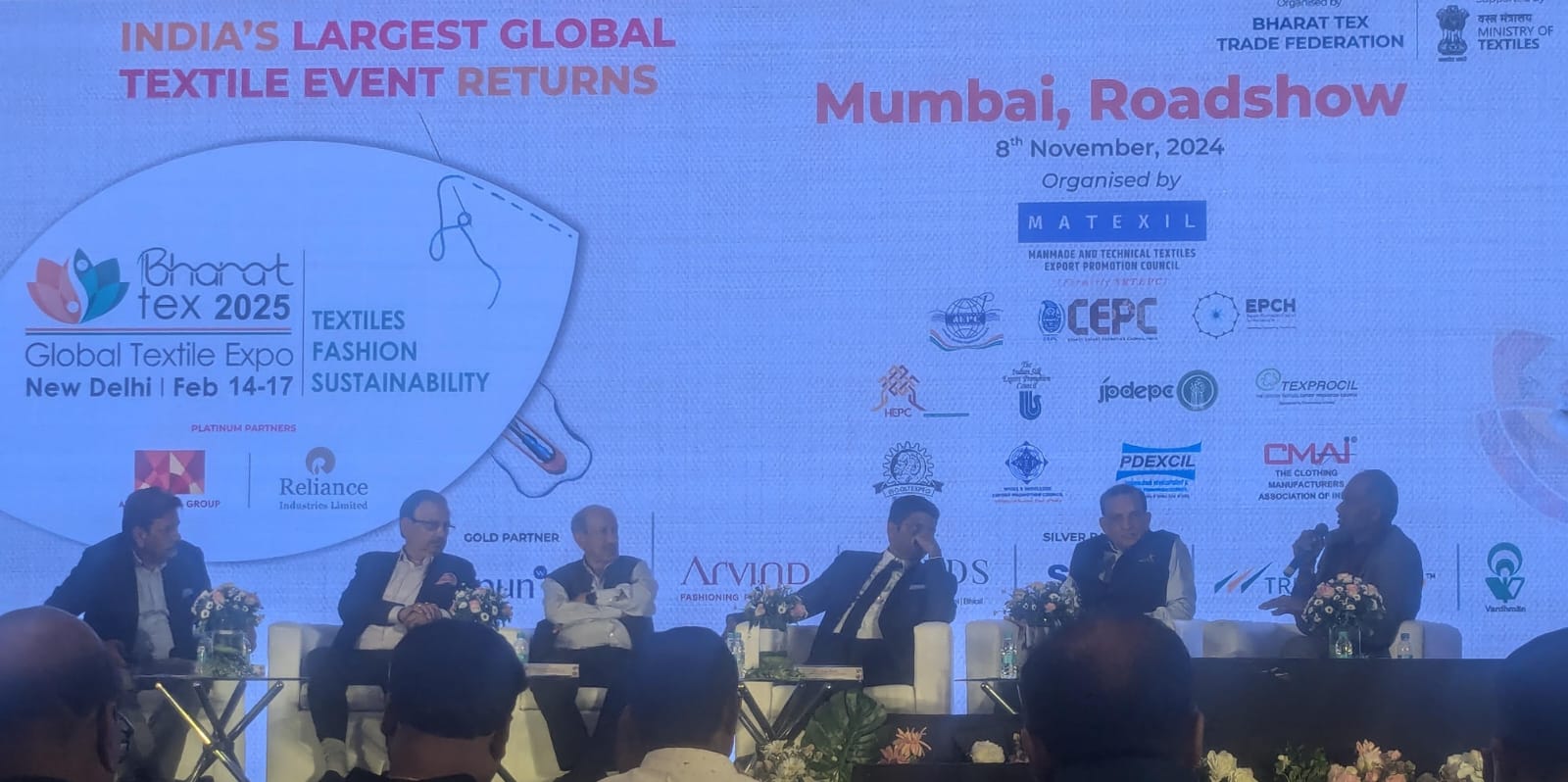FW
Texcare International 2024, taking place from November 6-9, will focus on critical issues in the textile care industry, including automation, energy conservation, circular models, and textile hygiene. The event, supported by industry partners like DTV, VDMA, EFIT, ETSA, and Hohenstein Laboratories, promises to provide forward-thinking solutions through its robust programme.
The Texcare Forum, which runs throughout the fair, offers free expert-led lectures on themes such as automation, sustainability, and textile hygiene. Panels by VDMA and EFIT will address automation, including robotic advancements and digital product passports, while Hohenstein will focus on hygiene in healthcare textiles. The ‘Energy and Resources’ panel, hosted by VDMA, will explore carbon dioxide neutrality and energy management innovations. ETSA’s contribution will spotlight textile recycling, logistical challenges, and circular economy advancements.
An added highlight is the exhibitor-led presentations, where industry leaders like Ecolab and Electrolux will showcase innovative products. Texcare Forum’s ‘International Market Updates’ will feature expert insights into markets like North America and Scandinavia, while Texcare France will explore developments in the €3 billion French textile market.
New additions to Texcare 2024 include guided tours of top innovations and the ‘Young Competence’ initiative aimed at addressing the skilled labor shortage by engaging vocational students. Industry association events, such as CINET’s PTC World Congress and Global Best Practices Awards, further enhance Texcare’s international relevance.
Daily networking events, including a happy hour, will offer attendees opportunities to forge new connections and exchange ideas, rounding out the four-day trade fair.
Arthur Hoeld, adidas AG’s Executive Board member responsible for Global Sales, will step down earlier than planned. Initially set to serve until March 31, 2026, his mandate will now end on October 31, 2024. Hoeld’s departure was mutually agreed upon with the Supervisory Board, concluding his 26-year career with the company.
Effective November 1, 2024, Mathieu Sidokpohou, currently Managing Director for Europe, will take over as Executive Board member for Global Sales. A French national, Sidokpohou joined adidas in 2020, holding leadership roles as General Manager of Adidas France and later overseeing the Cluster South Europe before managing the entire European market.
Adidas CEO Bjorn Gulden praised Sidokpohou’s role in driving 20 per cent growth in Europe and expressed optimism about continuing business growth under his leadership. Gulden also acknowledged Hoeld’s extensive contributions to the brand during his long tenure.
Thomas Rabe, Chairman of Adidas AG’s Supervisory Board, also expressed gratitude to Hoeld for his leadership and praised Sidokpohou’s strong omnichannel experience, highlighting his valuable retail background.
As of November 1, 2024, Adidas AG’s Executive Board will comprise Bjorn Gulden (CEO and Global Brands), Harm Ohlmeyer (CFO), Michelle Robertson (Global Human Resources), and Mathieu Sidokpohou (Global Sales).
Karl Mayer Warp Preparation has secured a new contract following a successful showcase at ITMA ASIA + CITME 2024, highlighting its focus on sustainability and efficiency. Among the top attractions were its latest-generation beam warping machine, capable of speeds up to 1,200 m/min, the new Cascade system, and the innovative Smart Size Box, which drew interest from visitors, including Pinhua Garments Co.
Pinhua Garments, based in Shijiazhuang, China, specializes in recycled staple fibres and has invested in Karl Mayer's new Prosize with VSB Size Box, marking the solution’s debut in the Chinese market. Already using Karl Mayer's earlier sizing machines, Pinhua Garments was impressed by the Smart Size Box's predictive maintenance capabilities, which reduce downtime and maintenance costs.
The VSB Size Box, with its advanced sizing technology, reduces sizing additive usage by up to 10 per cent, saving on costs and energy, and is particularly beneficial for processing cotton. The investment reflects Pinhua Garments' confidence in Karl Mayer’s continuous innovation.
Gabriel Chiu, Regional Sales Manager, expressed his satisfaction with the partnership, emphasizing the company's long-standing relationship with Pinhua Garments.
Levi’s Strauss has signed the International Accord, a legally binding agreement for garment worker safety, following years of pressure from unions and advocacy groups like the Clean Clothes Campaign. The decision comes after a deadly explosion at Levi’s supplier factory, Combined Fabrics, in Pakistan, which killed one worker and injured four others.
The Accord was established after the 2013 Rana Plaza collapse in Bangladesh, ensuring safety inspections and hazard remediation in factories. Levi’s participation marks a significant step in protecting workers in Pakistan, a country with a notoriously unsafe garment sector. The International Accord expanded to Pakistan in 2023, with further country programmes expected.
Levi’s had long resisted joining the Accord, opting instead for the Nirapon initiative in Bangladesh, which lacked binding commitments and strong union involvement. However, persistent campaigning by unions, including Workers United and Clean Clothes Campaign, highlighted the brand’s inadequate safety monitoring. A petition signed by nearly 70,000 people and years of protests finally pushed Levi’s to sign the Accord.
Zehra Khan of the Home-Based Women Workers Federation in Pakistan expressed relief that Levi’s took responsibility but mourned the lives lost while the company delayed action. The Clean Clothes Campaign now urges Levi’s to extend the Accord to Bangladesh and calls on other major brands like Nike and Amazon to join the safety agreement for Pakistani workers.
The International Accord includes provisions for inspections, remediation, worker training, and a complaint mechanism, ensuring that Levi’s supplier factories in Pakistan will now meet safety standards, while safeguarding workers' rights to voice concerns without fear of retaliation.
Despite global headwinds and continued inflationary pressure, India’s garment exports rose by 8.5 per cent to $7.5 billion during the Apr-Sep’24 quarter, data from the Commerce Ministry of India indicates.
As per data from the Apparel Export Promotion Council (AEPC), India registered a 17.3 perincrease in its RMG exports to $11.1 billion during the quarter. In Sep’24 alone, India’s RMG exports grew by 17.3 per cent to $1.11 billion
Sudhir Sekhri, Chairman, APEC opines, India benefits from its low dependence on imports, existence of the entire ecosystem from fiber to fashion, and abundant and young labor force which offers it an unlimited scope for growth
This year, garment exporters from India will not only participate in many big international fairs but also host the Bharat Tex 2025 expo, Sekhri adds.
The council will also conduct international roadshows in Spain and New York this month, to showcase the best of trade, technology and tradition, he notes.
Mithileshwar Thakur, Secretary General, AEPC avers,despite geo-political challenges and supply chain disruptions, India has been logging impressive double-digit growth in RMG exports since the past few months.It mainly exports its garments to the US, UK, Germany, Spain, and Netherlands, he adds.
Driven by a double-digit growth in the Americas and Asia, Italian luxury group Brunello Cucinelli recorded a 12.7 per cent rise in revenues at constant exchange rates during Q3, FY25 spanning Jan-Sep’24.
Revenue of the Italian luxury group increases as global demand for luxury goods slows as the company not only focuses on higher-end consumers but also limits its exposure to China compared to its rivals.
In Q3, FY25, the group’s revenues rose by 9.2 per cent to €300 million ($325 million), a little above the €298 million forecast by Equita Analysts.
The company’s sales in the Chinese market also grew during the quarter ending Sep’24. Best known for its cashmere clothing, the luxury brand projects,its sales will rise by around 10 per cent during 2025 and the following year.
Earlier this week French luxury giant LVMH registered a 3 per cent decline in Q3, FY25 sales as demand in China and Japan weakened.
The Global Organic Textile Standards (GOTS) has banned five Indian cotton companies for two years after uncovering fraudulent practices in their certification process. GOTS, a German-based organisation responsible for certifying the organic quality of textiles, discovered that these firms used fictitious shipping companies to falsely demonstrate the transit of goods.
Among the banned companies, two are based in Odisha, while the other three operate from Gujarat. Investigations revealed that the Odisha-based companies submitted forged National Organic Program (NOP) transaction certificates with QR codes leading to fake websites, further confirming the fraud.
GOTS highlighted that no actual cotton purchases were made, and no material transfers occurred. It was also revealed that the fraudulent transactions violated GOTS rules, with cotton allegedly transported over 800 kilometres, far exceeding the 500kilometre limit set for organic cotton.
The certification ban prevents these companies from claiming GOTS organic certification for two years. GOTS emphasized that it conducted a thorough investigation before imposing the penalties. The organisation has taken similar actions previously, banning four other Indian companies in September for fraudulent organic cotton activities.
Demonstrating a strong performance, Pakistan's textile rose by 17.9 percent to $1.605 billion in Sep 2024as compared to $1.36 billion in the same month last year. Driven by an increase in exports of finished goods, this growth signals a shift in the industry towards exporting value-added products rather than raw materials.
Pakistan’s RMG exports increased by 35 percentduring the month,as per latest figures from the Pakistan Bureau of Statistics (PBS).For the entire fiscal year 2023-24, Pakistan’s textile exports rose by 0.9 per cent to $16.65 billion.
In Sep’24, cotton cloth exports by Pakistan grew 15.33 percent to $201 million while knitwear exports expanded by 29.57 per cent to $448.3 million. The exports of bed wear increased by 24.8 percent to $290.2 million while towel exports grew by 7.35 percent to $90.55 million.Pakistan also recorded a 35 per cent increase in RMG exports to $338.4 million from the previous year. Conversely, exports of unfinished products, especially raw materials, declined sharply. Exports of cotton yarn declined by 54.22 percent to $52 million, while raw cotton exports contracted to zero.
India’s textile exports rose by about 9.56 per centto $1,813.27 million in Sep’24 as against$1,655.06 million registered in Sep’23.
As per an analysis by the Confederation of Indian Textile Industries (CITI), India’s apparel exports grew by17.30 per cent to $1,110.11 million during the month as compared to $946.35 million exports reported in the corresponding period last year.
The cumulative exports of textiles and apparel grew by 12.38 per cent to $2,923.38 million during Sept’24 as against $2,601.41 million in the corresponding month last year.
From Apr-Sept’24, India’s textiles exports grew by 2.76 per centto $10,155.48 million as against $9,882.49 million in the corresponding period last year while Apparel exports grew by 8.51 per centto $7505.14 million from $6916.44 during same period last year.
Cumulative exports of textiles and apparel during Apr-Sept’24 grew by5.13 per cent$17,660.62 million as compared $16,798.93 million in the Apr-Sept’23 period.
Concerned over the fate of the cotton farmers in Gujarat, S Niranjan Reddy, BRS Leader and Former Minister has urged Cotton Corporation of India (CCI) open the cotton purchase centers immediately. He also urged for an extension of the support price given to cotton in Gujarat to Telangana farmers as well.
Telangana farmers have been suffering due to heavy rains in the state, Reddy said. These farmers are struggling to stock their cotton as the State government has failed to set up CCI purchase centers, pushing the farmers into the hands of middlemen, he added. Farmers in the state are being forced to sell their cotton at Rs 5,500 per quintal. They are finding it difficult to get at least the support price of Rs 7,521, he stated further.
In contrast, Gujarat is purchasing cotton at Rs 8,257 per quintal while Telangana farmers get only Rs 7,521. The two central ministers from Telangananeed to ensure that the cotton prices in Gujarat are extended to Telangana also, Reddy affirmed.
The former minister criticised the State government for not taking responsibility for the agricultural sector, which supports 2.5 crore people in the state. The state has not yet implemented the Rythu Bandhu scheme, and farmers are not receiving the promised Rs 500 bonus per quintal for paddy. Additionally, restrictions are being imposed on the quality of paddy to deny farmers their bonus, he notes.












